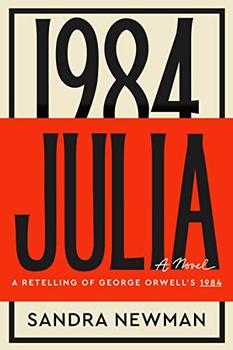Reading Guide Questions

Please be aware that this discussion guide will contain spoilers!
- Overall, what do you think of Julia? (no spoilers in this thread please)
-
Have you read 1984? How familiar were you with the world of Julia before reading it? What
language and concepts had you heard before?
-
What do you think about Winston and Julia's relationship? Does Winston really love Julia? Does
she love him? Do you think love is possible in Oceania?
-
Place yourself in Oceania. What role do you think you might play? How might you react against,
comply with, and cope with the strictures of that society?
- Do you see parallels between how we are living now to the world of Orwell's 1984? How about
parallels to past world events? If you've read 1984, does Julia introduce different parallels?
-
Do you think surveillance makes us safer? What is the difference between a device like Alexa and
the telescreens of 1984? What about closed-circuit television?
- What do you think gives Julia the strength to flee? Why aren't others (Winston, Ampleforth) able
to do the same?
- What do you think about the portrayal of women in Julia? Are women more or less likely to fully
subscribe to propaganda than men?
- Which aspect of Julia's world did you find most frightening? Why?
- At the beginning of the book, Julia appears to have faith in the Party's goals for their society and
expresses love for Big Brother. How do you think a person's idea of what is factual becomes
distorted? Do you feel there's a way we can avoid being manipulated into false views?
- Residents of London perform various rituals, such as the Two Minute Hate and the daily
Rhythmic Jerks. What role do you feel these and other rituals play throughout the novel? Which
rituals do we observe in our culture? Why do you suppose we practice them? Are there any
that you feel are particularly helpful or harmful?
- The Party's children are indoctrinated with songs, fairy talks and membership in the Spies. Do
you think this is an effective tool for achieving the Party's ends? In what ways do we
indoctrinate our children today, teaching them to accept a set of beliefs uncritically? What is the
line between indoctrination and teaching values?
- In Julia's world, people wear sashes to indicate sexual availability (Anti-Sex League, artsem).
What do you think of this system?
- In reminiscing about the challenges of her youth, Julia thinks, "[W]hat childhood was not
fearsome?" What do you think? Do our childhoods scar us all?
- Julia relates the terrible conditions in the slums. ("[A]ll was grimy, shabby, broken, befouled.
The smell was indescribable, since the quarter's privies and overflowing rubbish tips were
regularly blasted sky-high by bombs, and there were also the rotting corpses of men and
beasts...".) Yet she herself lives in less-than-optimal circumstances and seems to largely accept
them. Why do you suppose she prefers her lifestyle? Which would you prefer, and why?
- Julia feels Winston is obsessed with the truth. ("My feelings don't matter in the least," he tells
her. "What matter is what's true.") What do you think matters to Julia? Do either of them
change their opinions by the end of the book? What are your thoughts about truth vs. feelings?
Can they be equally important?
- At the Ministry of Love, Julia sees Winston and thinks, "There is the cause of all my trouble." Do
you think that's true? How much is Julia to blame for her own circumstances? Do you think she
would have been recruited by O'Brien if she'd never passed the note to Winston? Why or why
not?
- What did you think of the end of the novel? Where do you suppose Julia goes from here, and
what is her lifestyle like?
- Julia seduces several men throughout the novel. How do you think she views them? How do
you think each views himself? If you've read 1984, how does Orwell's version of these
characters differ from Newman's?
Discussion topics created by BookBrowse
Unless otherwise stated, this discussion guide is reprinted with the permission of Mariner Books.
Any page references refer to a USA edition of the book, usually the trade paperback version, and may vary in other editions.

 Book Reviewed by:
Book Reviewed by:





